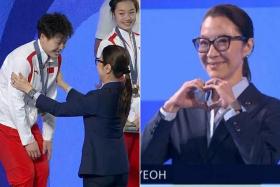French election crucial to EU's future
Far-right leader Le Pen has vowed to ditch the euro while ex-banker Macron is pro-European Union
PARIS France voted yesterday in the first round of a bitterly fought presidential election that is crucial to the future of Europe and a closely watched test of voters' anger with the political establishment.
Over 50,000 police backed by elite units of the French security services patrolled the streets less than three days after a suspected Islamist gunman shot dead a policeman and wounded two others on the central Champs-Elysees avenue.
Voters will decide whether to back a pro-European Union (EU) centrist newcomer, a scandal-ridden veteran conservative who wants to slash public spending, a far-left eurosceptic admirer of Fidel Castro or to appoint France's first woman president who will shut borders and ditch the euro.
The outcome will show whether the populist tide that saw Britain vote to leave the EU and Mr Donald Trump's election in the United States is still rising or starting to ebb.
A high level of indecision adds to the nervousness.
Mr Emmanuel Macron, 39, a centrist ex-banker who set up his party just a year ago, is the opinion polls' favourite to win the first round and beat far-right National Front chief Marine Le Pen in the two-person run-off on May 7.
For them to win the top two qualifying positions will represent a huge change in the political landscape.
The second round will then feature neither of the mainstream parties that have governed France for decades.
But conservative Francois Fillon is making a comeback after being plagued for months by a fake jobs scandal, and leftist Jean-Luc Melenchon's ratings have surged in recent weeks.
"It wouldn't be the classic left versus right divide but two views of the world clashing," said Ifop pollsters' Jerome Fourquet. "Mr Macron bills himself as the progressive versus conservatives, Ms Le Pen as the patriot versus the globalists."
The seven other candidates, including the ruling Socialist Party's Benoit Hamon, lag behind in opinion polls.
Some polls had been predicting a much lower turnout, closer to the 70 per cent that took the then National Front leader Jean-Marie Le Pen into the second round in 2002.
Pollsters are unclear about what a low or high turnout could mean this year. High unemployment, sluggish growth and the general trustworthiness of politicians are issues that concern voters.
- REUTERS
Get The New Paper on your phone with the free TNP app. Download from the Apple App Store or Google Play Store now



